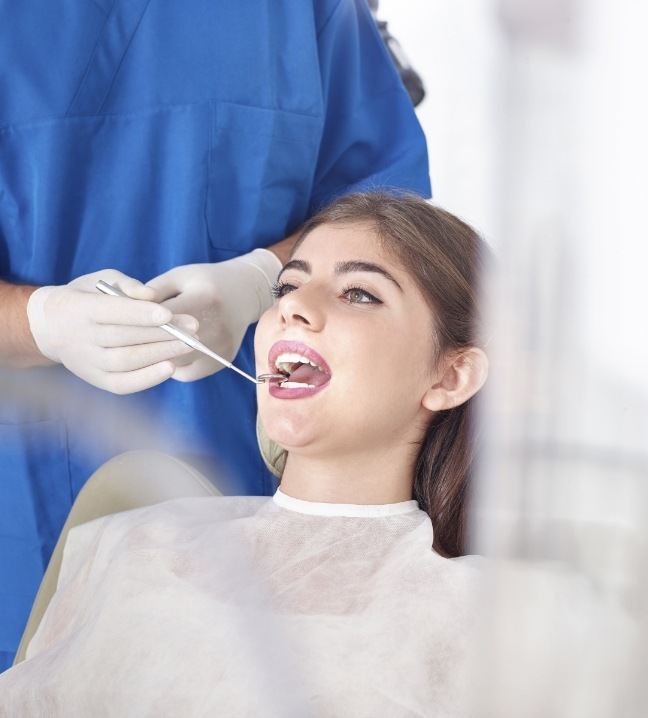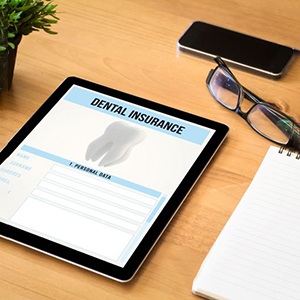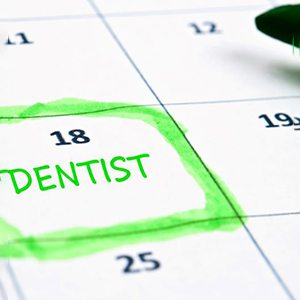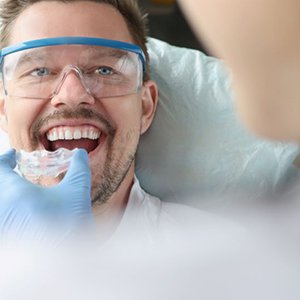Emergency Dentistry – Richardson, TX
We Can Help Stop Your Dental Pain

Toothaches, broken teeth, and other dental emergencies tend to strike without warning. Luckily, at Jupiter Family Dental of Richardson, we offer same-day emergency appointments so that you can get the care you need to stop your pain and protect your smile as soon as possible. It’s a good idea to keep our practice’s number on your phone so that if anyone in your family suddenly needs urgent dental care, help will be a call away.
Why Choose Jupiter Family Dental of Richardson for Emergency Dentistry?
- Same-Day Emergency Appointments
- Relaxing Nitrous Oxide Sedation
- After-Hour and Weekend Appointments Available
How We Treat Dental Emergencies

- Same-Day Appointment: Once you call our office, we’ll give you first aid advice for managing your symptoms, and we’ll make time to see you as soon as we can. In addition to same-day appointments, we also offer after-hour and weekend appointments in case of emergencies.
- Comprehensive Exam: We’ll need to perform a detailed examination to narrow down the source and severity of your dental emergency. We may need to take X-rays as well.
- Review Findings: Once we understand your situation, we can put together a treatment plan for you. When we give you a recommendation, we’ll make sure that you understand the estimated costs involved as well as the expected treatment timeline.
- Get the Care You Need: Emergency care could be as simple as placing a filling or as complex as performing root canal therapy. No matter what kind of care you need, though, you’ll have our friendly, reliable Jupiter Family Dental of Richardson team to help you overcome your pain and restore your grin.
The Most Common Dental Emergencies
No one definition describes every dental emergency. As such, below we’ve provided a list of some of the most common emergencies that our office sees. Even if you don’t think your situation qualifies as an emergency, you can call our office to explain your situation; we’ll let you know what you should do next based on your symptoms.
Understanding the Cost of Emergency Dentistry

Since there are different types of dental emergencies, the cost of treating them is naturally going to vary from patient to patient. We will let you know how much you can expect to pay for a given treatment when we give you our recommendations. If you’re worried about how you’re going to fit the cost of emergency care into your budget, our team can help you explore your options and guide you through the payment process.
Every Dental Emergency Is Different

An emergency dental exam is relatively inexpensive. Once we understand the problem as thoroughly as possible, we can recommend a treatment plan. There are a number of different services that we use to address emergency situations, and their prices can vary significantly. For example, you might need a simple extraction or filling, both of which tend to have a somewhat low cost. However, you could also need root canal therapy, a crown, or other treatments.
Before we move forward with treating you, we will make sure that you understand the financial aspect of your care. We do not want you to run into any unpleasant surprises when you have to pay for your visit!
Taking Care of Your Smile Can Save You Money

Some dental emergencies occur because of an unavoidable accident. In most cases, though, they are the result of longstanding dental problems that did not receive timely treatment. Therefore, we always advise our patients to be diligent about taking care of their teeth on a regular basis, both through a good at-home oral hygiene routine and twice-yearly cleanings and checkups.
Also, keep in mind that you should visit us at the first sign of a dental problem; you should not wait until you are in severe pain. The earlier we can identify issues, the more likely it is that they can be addressed via conservative, affordable treatment. Plus, by taking preemptive action to avoid an emergency situation, you can avoid losing time from work.
Does Dental Insurance Cover Dental Emergencies?

It is common for dental insurance policies to cover the cost of one emergency exam each year. They also frequently cover the treatments that are used in emergency care, such as fillings, crowns, extractions, and more. Depending on the nature of your situation, anywhere from 50% to 80% of your treatment costs might be covered. Our team welcomes insurance, and we will do all we can to help you maximize your benefits.
Other Options for Making Dental Emergencies Affordable

If you do not have dental insurance, or your insurance will only cover a small portion of your care, you may consider using financing to make it easier to fit your treatment into your budget. We work with both CareCredit and Sunbit to help our patients arrange for low-interest payment plans. The application process is fast, and most patients are quickly approved.
You should not let financial concerns hold you back from receiving necessary treatment! Our team is ready to help you get out of pain and navigate the monetary aspect of your care.
How to Prevent Dental Emergencies

Our Richardson team is always ready to leap into action to help you find relief from the pain and worry that often accompany a dental emergency. But wouldn’t it be better to prevent an emergency from happening in the first place? Here are some practical tips to help you reduce your risk of an urgent oral health problem:
Visit Your Dentist Regularly

You should make it your custom to attend a professional cleaning and checkup twice each year. At these appointments, we thoroughly clean your teeth, removing plaque and tartar that might otherwise lead to serious issues down the road. We also perform a thorough exam, which can reveal most dental problems while they are still in their early stages — long before they start to cause any obvious symptoms. Then, we can arrange for prompt treatment that helps you steer clear of a future emergency.
Maintain Good Oral Hygiene Habits at Home

Thorough daily oral hygiene helps to prevent the buildup of plaque and tartar that could lead to decay and gum disease. You should:
- Brush your teeth twice a day — be sure to clean the backs of your teeth and the area along your gumline.
- Floss once a day.
- Use a mouth rinse that is tailored to your needs. (For example, some people use a fluoride rinse to reduce the risk of cavities.)
- Drink plenty of water.
Be Careful with Your Diet

Missteps in what you eat could contribute to a dental emergency. Here are some basic dos and don’ts:
- Limit your intake of sugary, starchy, and acidic foods and beverages. These can weaken your tooth enamel over time.
- Be careful when consuming bone-in meats. If you bite down too hard, you could break or chip a tooth.
- Eat lots of nutrient-rich foods that support oral health. For example, you should make sure you get enough calcium and vitamin D.
Wear a Mouthguard

There are two types of mouthguards that can help to prevent an emergency:
- A sportsguard should be worn whenever you are engaging in physical activity that might lead to an oral injury, such as football or wrestling.
- A nightguard can prevent teeth grinding and clenching at night. Therefore, it can reduce wear and tear on your teeth. If you do not know if you grind your teeth while you are asleep, ask your partner if they have noticed you clenching your jaw. A sore face in the morning can also point to teeth grinding.
Do Not Use Your Teeth as Tools

Teeth might seem like a convenient means of opening packages, trimming your fingernails, or cutting the tags off new clothing. However, it is important to remember that teeth are designed to chew food, not to double as a pair of scissors or fingernail clippers. Misusing your teeth could cause them to break, chip, or suffer premature wear and tear. You might find it helpful to carry a small multi-tool with you so you are less tempted to use your teeth for purposes other than eating.
Dental Emergency FAQs

If you ever find yourself in the midst of a dental emergency, our expert team is ready to serve you. Before you book your consultation, however, you may want to know more about emergency dentistry and what to expect from treatment. To help you gather information, we have compiled the following list of FAQs, along with succinct and easy-to-digest answers. If your specific questions are not included here, please reach out to us directly.
Will My Toothache Go Away on Its Own?
Teeth cannot heal themselves, so it is unlikely that your toothache will go away on its own. However, there are a couple of possible exceptions:
- The pain might be coming from near the tooth, rather than the tooth itself. This can happen if you have a sinus infection, gum injury, or other issue that puts pressure on your teeth without actually hurting them.
- The tooth died. When the nerve inside a tooth dies, it can no longer send pain signals to the brain. However, the infection that caused the original toothache may still be present. It could continue causing damage. Therefore, you should seek care right away.
Should I Visit the Emergency Room First for Dental Emergencies?
Unfortunately, most hospital emergency rooms do not have the means to address dental emergencies. They may not have the proper equipment, and they are unlikely to have an experienced oral health profession on staff. In most cases, the best they can do is provide pain medication and tell you to visit your dentist ASAP.
Of course, there are some instances when the ER should be your first stop:
- You suspect your jaw is broken or dislocated.
- An oral infection is interfering with your ability to breathe or is causing a high fever.
- You are bleeding uncontrollably.
- You are dealing with other potentially life-threatening symptoms.
My Chipped Tooth Doesn’t Hurt. Do I Still Need to Visit?
Even if you are not in pain, it would still be wise to visit us as soon as you reasonably can. The tooth’s jagged edges might irritate the soft tissues in your mouth, and there is a chance that the tooth’s sensitive inner layers are exposed. There is also the risk that the damage could easily worsen. Our team can thoroughly assess the situation and take steps to reduce or prevent any future pain that might be associated with the situation.
What Is Causing My Jaw Pain?
Jaw pain can be the result of numerous causes:
- Chronic teeth grinding and clenching
- TMJ disorder (TMD)
- A broken or dislocated jaw
- A misaligned jaw
- Cysts or infection
- Old or fresh injuries
Dr. Hsia and our team will do what we can to identify the cause of the pain and help you find relief.




